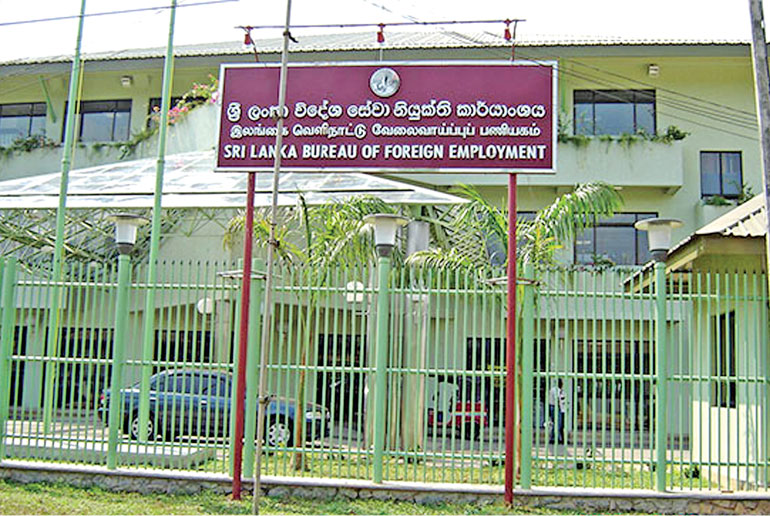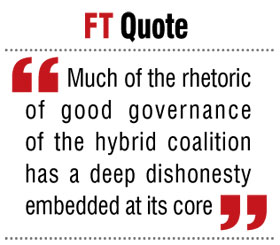Tuesday Feb 17, 2026
Tuesday Feb 17, 2026
Tuesday, 16 August 2016 00:02 - - {{hitsCtrl.values.hits}}
The Rajapaksa regime had a method in its madness. Ranil’s regency of the Maithripala presidency has retained the madness and abandoned method. Their reforming gusto is bluster and bombast. Underneath lies a blatant disregard for accountability. The Foreign Employment Bureau is a case in point.
The Foreign Employment Bureau in its website promulgates that it is mandatory for all Sri Lankans leaving for Employment Abroad to register with the Sri Lanka Bureau of Foreign Employment.
Under the stewardship of Thalatha Athukorale, Minister of Foreign Employment, Sri Lankans going abroad for employment must pay a Registration fee of Rs. 15,200+VAT 15%+NBT 2%.
 The Foreign Employment Bureau
The Foreign Employment Bureau
Under the Rajapaksa regime, export of labour was declared Government policy. Migration for employment was encouraged. Recruiting was left in the hands of private agencies who developed a cosy interdependence with the regulatory agency – the Foreign Employment Bureau. It soon discovered that the enforcement and regulatory mechanism was a lucrative business. ‘Rata Viruwo’ helped pay for hoppers made in Haliela.
The new Minister of the ‘Yahapalana’ Government has already revealed in Parliament how funds of the Foreign Employment Bureau had been misused under the earlier regime.
Temporary migration of Sri Lankans for contractual employment overseas became a socioeconomic process in the late seventies. It is erroneously attributed to the partial liberalisation of the economy in 1977. The overnight removal of the Rs. 50 limit per person permitted for overseas travel by Ronnie De Meal was greeted as liberalisation by our leisured class. Not that it mattered. They had ingenious ways to stash dollars and sterling abroad in addition to Dr. N.M. Perera’s convertible Rupee Accounts.
Their exhilaration surpassed the elation of Berliners watching the demolition of the wall a decade later. A myth took form. A majority of our people watched television through shop windows for a good seven years later. But the myth of the Jayawardene era liberalisation took form. The phenomenon of migrant labour from Sri Lanka was mainly spurred by the bonanza of the ‘oil decade’ that changed the economies of the Arabian Peninsula and the gulf.
The steady increase of migrant labour for contractual employment prompted the Government to enact legislation – the Sri Lanka Bureau of Foreign Employment Act by Parliament in 1985. Its purpose was to regulate and monitor the process of labour migration.
Migration is exceptional and not normal human behaviour. Humans who undertake migration do so for a variety of reasons. In the case of migrant labour from Sri Lanka the critical and pivotal motivation is to escape poverty, deprivation and drudgery of living with pipe dreams and false hopes.
Professor Siri Hettige in a report exploring the psycho social issues confronting migrant workers and their families has said it in eloquent and brutal terms: “…the richness and cultural value of a society can often be judged not in the way it flaunts its strengths  but in the manner it tends its vulnerability. This broken, troubled and vulnerable community of labour migrant workers have through, and in spite of their hideous life choices and conditions, contributed the highest levels of foreign exchange to the coffers of our country. Increased effective investment in protecting, strengthening and fortifying the mental health and psychosocial wellbeing of this community is not an option but an imperative move for the health and wellbeing of the entire nation.”
but in the manner it tends its vulnerability. This broken, troubled and vulnerable community of labour migrant workers have through, and in spite of their hideous life choices and conditions, contributed the highest levels of foreign exchange to the coffers of our country. Increased effective investment in protecting, strengthening and fortifying the mental health and psychosocial wellbeing of this community is not an option but an imperative move for the health and wellbeing of the entire nation.”
It is these people who are required by Thalatha Athukorale to pay Rs. 15,200+VAT 15%+NBT 2% before venturing abroad.
Mandatory registration of persons leaving for employment abroad is a reasonable precaution to monitor a business that has been marked by disturbing instances of flagrant human trafficking, miserable working conditions and merciless exploitation of human aspirations. The registration and monitoring can be done by an augmented department of immigration and emigration.
Why must the Foreign Employment Bureau be empowered to intercept passengers at the airport and insist that they pay the levy due to them? If it is a registration fee why should the migrant worker pay VAT and Nation Building Tax in addition to a service provided by a caring state? Why persist in practicing the cynical mercenary policy of the predecessors?
In 2009 the Government converted the FEB into a gravy train by making registration mandatory on payment of a fee and putting in place a system of policing and ensuring compliance.
This writer has a real life experience relevant to these questions. My daughter who works for a multinational in an East Asian country had an unpleasant encounter with an FEB operative who informed her that she had to pay the FEB levy before she could be allowed to proceed to the check in counter. There is no doubt that the FEB officer was convinced that he was discharging his duty. As it turned out, indeed he was acting as a ‘peace officer’ a legalese euphemism bestowed on him by statute.
Repeated emails sent to the General Manager and Chairman of the Foreign Employment Bureau have not been answered. The rest of the story is best narrated by two emails sent by this writer – the first to the additional General Manager Legal of the Foreign Employment Bureau with copies to those concerned and the other to my daughter instructing her to comply with the law and complaining later.
 To the Additional General Manager [Legal] FEB:
To the Additional General Manager [Legal] FEB:
I thank you for meeting me today regarding the email I addressed to the General Manager and Chairman FEB concerning the unfortunate experience of my daughter at the Katunayake Airport with an officer of the FEB.
As I explained to you clearly, if the law of the land stipulates that every Sri Lankan employed abroad must pay a levy to the Government, we have no choice but to comply first and complain later. I shall so inform my daughter. I await your kind communication to my daughter advising her that she is compelled by law to pay this levy to the FEB. I trust you will also explain to her the logic of subjecting this Government levy to VAT.
My following observations are as a concerned citizen and by no means intended to cast any aspersions on your professional competence or integrity. I enjoyed my conversation with you.
I could not ask you what legal consequences would follow in the event of a refusal to pay the levy. You indicated the parallel of FEB being something akin to Telecom. In their case failure to pay for services provided is disconnection. Pray tell me what is yours?
I am disappointed that I am yet to receive a response from a person of authority at the FEB. In the second decade of the 21st Century it is a matter for regret that neither your General Manager nor your Chairman has had the courtesy of advising me that they have received my mail.
The excuses offered by some innocuous secretary that they are either at meetings or have been summoned to Parliament is a sorry commentary on the sense of public accountability of those holding positions of authority. It is aggravated by the notion that it is an institution of which the raisons d’être is the welfare of our citizens employed abroad mostly in unskilled vocations as virtual hostages to their aspirations and hopes.
In fact you seem to anticipate their fate by informing in your web site that the funds you collect are for measures such as: Quote “The fees so collected are used for the benefit of Sri Lankans employed abroad and their left behind family members through various welfare programmes locally and overseas (i.e. maintenance of safe houses for destitute female workers, repatriation of destitute workers, insurance coverage, legal assistance for needy workers etc.)” Unquote http://www.slbfe.lk/page.php?LID=1&MID=37.
I was one of those citizens who actively wrote both in print media and in cyber space to bring about what we hoped was a transformational change. As I explained to you at my age it is a forlorn hope. My visit to your plush offices was my first, though I happen to reside in the neighbourhood. The ambience of the centre court was spoilt by the teeming humanity waiting I do not know for what. The indolence and lethargy palpable in the corridors and in cubicles was suffocating. So I repeat what I told you in your office. It is a gravy train. I now know why Rizana died. The tragedy is that nothing has changed.
The mail sent to my daughter advising her to pay the levy to the Foreign Employment Bureau.
To my daughter:
Dearest Podi Duwa, I have had no response from either the General Manager or the Chairman of the Foreign Employment Bureau to my emails re. your experience at the Colombo Airport.
I had an interview with a lady – Additional GM legal of the FEB. Apparently she is the only literate official in the outfit.
The FEB is operating under a gem of a piece of legislation enacted by the former government in October 2009. It authorises officers of the FEB to examine any document in the possession of a person going abroad for employment, at any port of embarkation, for the purpose of verifying whether the registration has been obtained in compliance with the act where officers have reason to believe that such person is going abroad without having obtained the required registration under the act; And to receive social security levies from employers abroad for the welfare of Sri Lankan employees.
The intent of requesting overseas employers to remit social security levies to the FEB is imbecilic. However you must remember that this legislation was passed by a Parliament that also enacted the 18th amendment.
Yet it happens to be the law. That the previous regime institutionalised mass export of raw sweat of our women is a given. Why such statutes still remain is baffling. Citizens must call for its repeal as it violates article 12 of the ICCPR which the present Government has promised to honour and make applicable in the land.
Since I don’t wish to see you inconvenienced in your regular shuttling between home and work place I suggest you go to the High Commission and pay the equivalent of Rs. 15,000 which is the levy. I do not know the legality of their demanding VAT on it. Presently there is a Supreme Court ruling on it. There is also a Nation Building Tax of 2% which is another beauty.
I make this recommendation not with joy. What else can we do in dealing with a set of primates who do not have the civility to acknowledge emails?
To other addressees of this mail – please note the law does not permit you to restrain a passenger from proceeding to the check in counter unless with a court order.
I am disappointed. Much of the rhetoric of good governance of the hybrid coalition has a deep dishonesty embedded at its core.